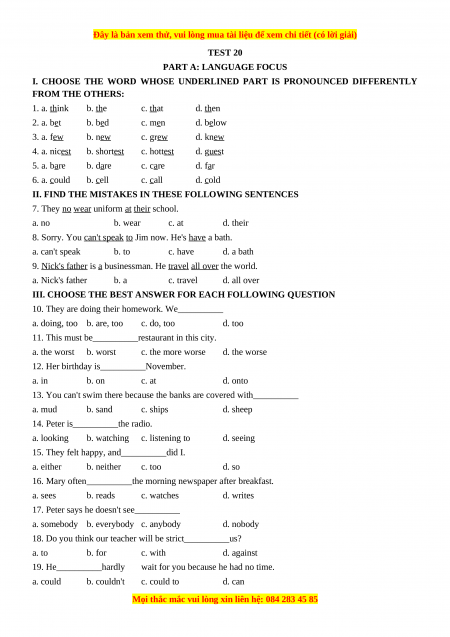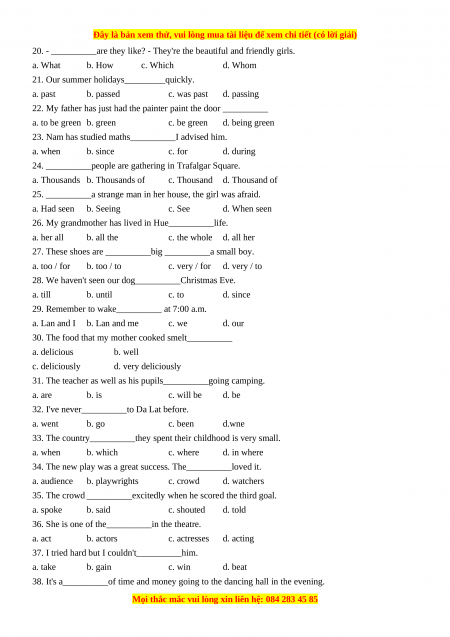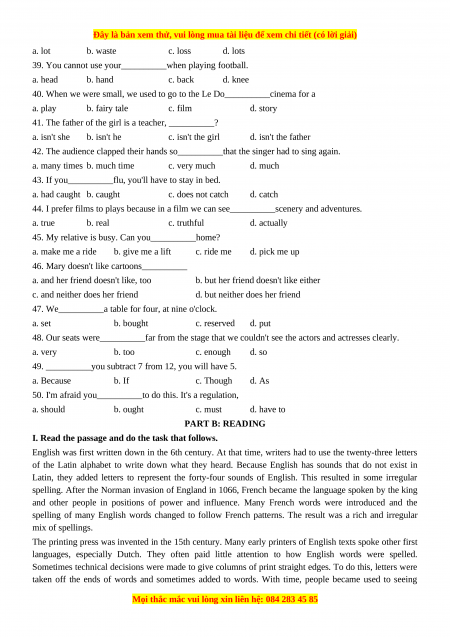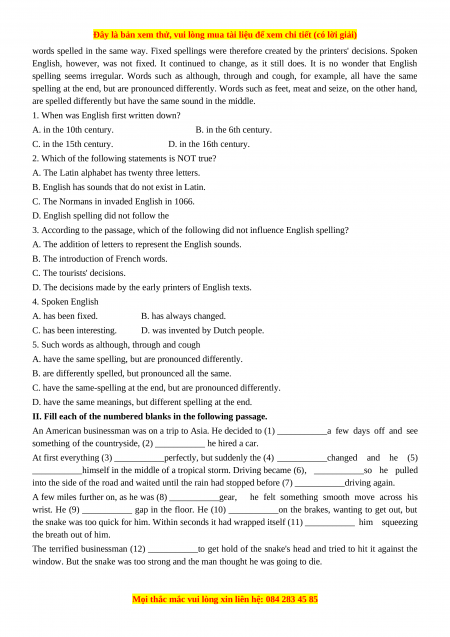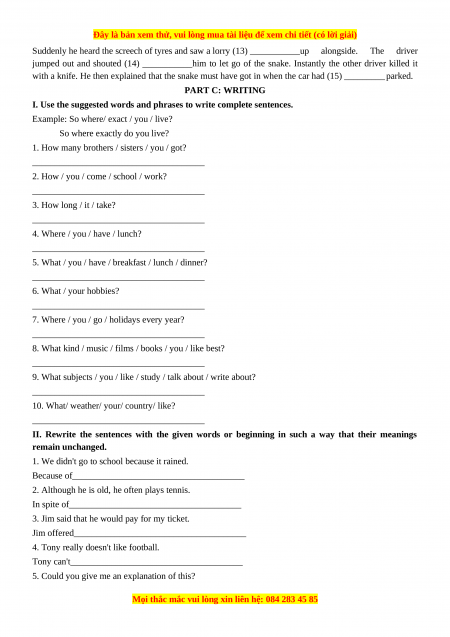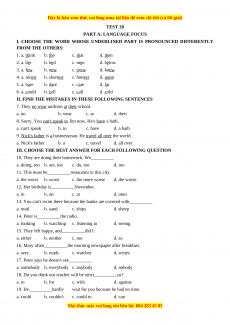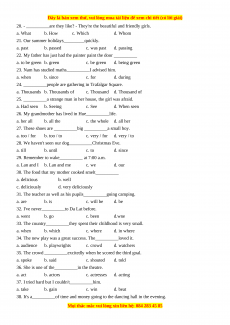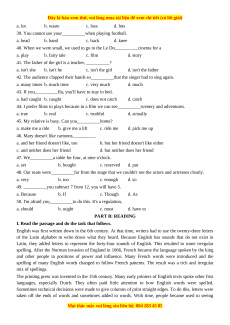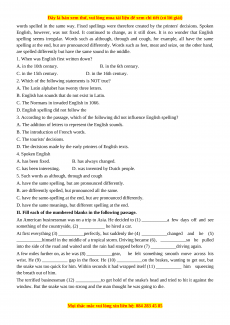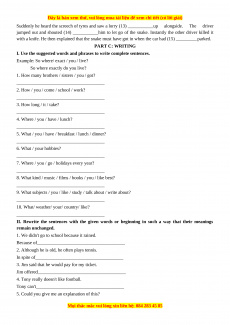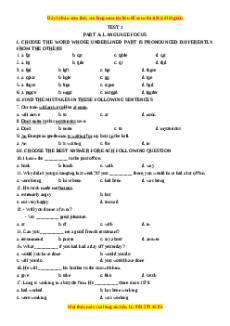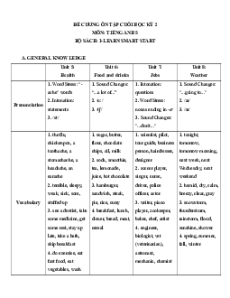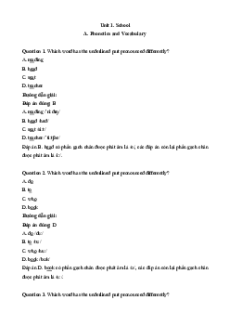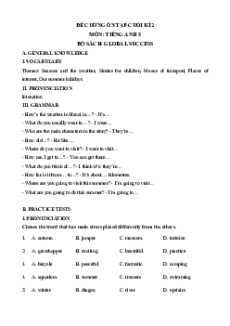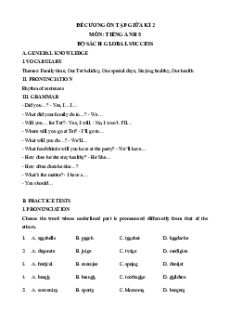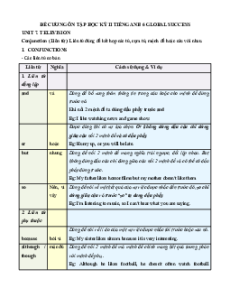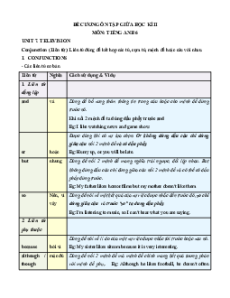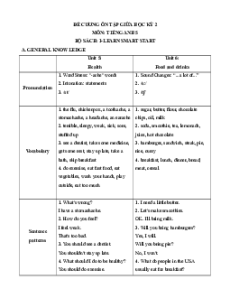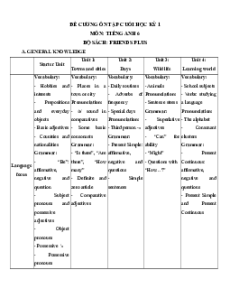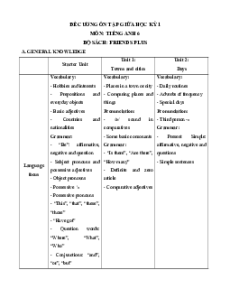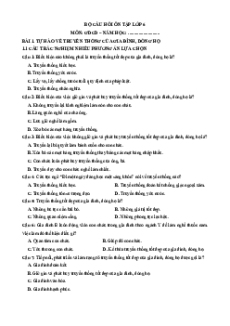TEST 20 PART A: LANGUAGE FOCUS
I. CHOOSE THE WORD WHOSE UNDERLINED PART IS PRONOUNCED DIFFERENTLY FROM THE OTHERS: 1. a. think b. the c. that d. then 2. a. bet b. bed c. men d. below 3. a. few b. new c. grew d. knew 4. a. nicest b. shortest c. hottest d. guest 5. a. bare b. dare c. care d. far 6. a. could b. cell c. call d. cold
II. FIND THE MISTAKES IN THESE FOLLOWING SENTENCES
7. They no wear uniform at their school. a. no b. wear c. at d. their
8. Sorry. You can't speak to Jim now. He's have a bath. a. can't speak b. to c. have d. a bath
9. Nick's father is a businessman. He travel all over the world. a. Nick's father b. a c. travel d. all over
III. CHOOSE THE BEST ANSWER FOR EACH FOLLOWING QUESTION
10. They are doing their homework. We__________ a. doing, too b. are, too c. do, too d. too
11. This must be__________restaurant in this city. a. the worst b. worst c. the more worse d. the worse
12. Her birthday is__________November. a. in b. on c. at d. onto
13. You can't swim there because the banks are covered with__________ a. mud b. sand c. ships d. sheep
14. Peter is__________the radio. a. looking b. watching c. listening to d. seeing
15. They felt happy, and__________did I. a. either b. neither c. too d. so
16. Mary often__________the morning newspaper after breakfast. a. sees b. reads c. watches d. writes
17. Peter says he doesn't see__________
a. somebody b. everybody c. anybody d. nobody
18. Do you think our teacher will be strict__________us? a. to b. for c. with d. against 19. He__________hardly
wait for you because he had no time. a. could b. couldn't c. could to d. can
20. - __________are they like? - They're the beautiful and friendly girls. a. What b. How c. Which d. Whom
21. Our summer holidays_________quickly. a. past b. passed c. was past d. passing
22. My father has just had the painter paint the door __________ a. to be green b. green c. be green d. being green
23. Nam has studied maths__________I advised him. a. when b. since c. for d. during
24. __________people are gathering in Trafalgar Square. a. Thousands b. Thousands of c. Thousand d. Thousand of
25. __________a strange man in her house, the girl was afraid. a. Had seen b. Seeing c. See d. When seen
26. My grandmother has lived in Hue__________life. a. her all b. all the c. the whole d. all her
27. These shoes are __________big __________a small boy. a. too / for b. too / to c. very / for d. very / to
28. We haven't seen our dog__________Christmas Eve. a. till b. until c. to d. since
29. Remember to wake__________ at 7:00 a.m. a. Lan and I b. Lan and me c. we d. our
30. The food that my mother cooked smelt__________ a. delicious b. well c. deliciously d. very deliciously
31. The teacher as well as his pupils__________going camping. a. are b. is c. will be d. be
32. I've never__________to Da Lat before. a. went b. go c. been d.wne
33. The country__________they spent their childhood is very small. a. when b. which c. where d. in where
34. The new play was a great success. The__________loved it. a. audience b. playwrights c. crowd d. watchers
35. The crowd __________excitedly when he scored the third goal. a. spoke b. said c. shouted d. told
36. She is one of the__________in the theatre. a. act b. actors c. actresses d. acting
37. I tried hard but I couldn't__________him. a. take b. gain c. win d. beat
38. It's a__________of time and money going to the dancing hall in the evening.
a. lot b. waste c. loss d. lots
39. You cannot use your__________when playing football. a. head b. hand c. back d. knee
40. When we were small, we used to go to the Le Do__________cinema for a a. play b. fairy tale c. film d. story
41. The father of the girl is a teacher, __________? a. isn't she b. isn't he c. isn't the girl d. isn't the father
42. The audience clapped their hands so__________that the singer had to sing again. a. many times b. much time c. very much d. much
43. If you__________flu, you'll have to stay in bed. a. had caught b. caught c. does not catch d. catch
44. I prefer films to plays because in a film we can see__________scenery and adventures. a. true b. real c. truthful d. actually
45. My relative is busy. Can you__________home? a. make me a ride b. give me a lift c. ride me d. pick me up
46. Mary doesn't like cartoons__________
a. and her friend doesn't like, too
b. but her friend doesn't like either c. and neither does her friend d. but neither does her friend
47. We__________a table for four, at nine o'clock. a. set b. bought c. reserved d. put
48. Our seats were__________far from the stage that we couldn't see the actors and actresses clearly. a. very b. too c. enough d. so
49. __________you subtract 7 from 12, you will have 5. a. Because b. If c. Though d. As
50. I'm afraid you__________to do this. It's a regulation, a. should b. ought c. must d. have to PART B: READING
I. Read the passage and do the task that follows.
English was first written down in the 6th century. At that time, writers had to use the twenty-three letters
of the Latin alphabet to write down what they heard. Because English has sounds that do not exist in
Latin, they added letters to represent the forty-four sounds of English. This resulted in some irregular
spelling. After the Norman invasion of England in 1066, French became the language spoken by the king
and other people in positions of power and influence. Many French words were introduced and the
spelling of many English words changed to follow French patterns. The result was a rich and irregular mix of spellings.
The printing press was invented in the 15th century. Many early printers of English texts spoke other first
languages, especially Dutch. They often paid little attention to how English words were spelled.
Sometimes technical decisions were made to give columns of print straight edges. To do this, letters were
taken off the ends of words and sometimes added to words. With time, people became used to seeing
words spelled in the same way. Fixed spellings were therefore created by the printers' decisions. Spoken
English, however, was not fixed. It continued to change, as it still does. It is no wonder that English
spelling seems irregular. Words such as although, through and cough, for example, all have the same
spelling at the end, but are pronounced differently. Words such as feet, meat and seize, on the other hand,
are spelled differently but have the same sound in the middle.
1. When was English first written down? A. in the 10th century. B. in the 6th century. C. in the 15th century. D. in the 16th century.
2. Which of the following statements is NOT true?
A. The Latin alphabet has twenty three letters.
B. English has sounds that do not exist in Latin.
C. The Normans in invaded English in 1066.
D. English spelling did not follow the
3. According to the passage, which of the following did not influence English spelling?
A. The addition of letters to represent the English sounds.
B. The introduction of French words. C. The tourists' decisions.
D. The decisions made by the early printers of English texts. 4. Spoken English A. has been fixed. B. has always changed. C. has been interesting.
D. was invented by Dutch people.
5. Such words as although, through and cough
A. have the same spelling, but are pronounced differently.
B. are differently spelled, but pronounced all the same.
C. have the same-spelling at the end, but are pronounced differently.
D. have the same meanings, but different spelling at the end.
II. Fill each of the numbered blanks in the following passage.
An American businessman was on a trip to Asia. He decided to (1) ___________a few days off and see
something of the countryside, (2) ___________ he hired a car.
At first everything (3) ___________perfectly, but suddenly the (4) ___________changed and he (5)
___________himself in the middle of a tropical storm. Driving became (6), ___________so he pulled
into the side of the road and waited until the rain had stopped before (7) ___________driving again.
A few miles further on, as he was (8) ___________gear,
he felt something smooth move across his
wrist. He (9) ___________ gap in the floor. He (10) ___________on the brakes, wanting to get out, but
the snake was too quick for him. Within seconds it had wrapped itself (11) ___________ him squeezing the breath out of him.
The terrified businessman (12) ___________to get hold of the snake's head and tried to hit it against the
window. But the snake was too strong and the man thought he was going to die.
Test 20 - Bộ đề bồi dưỡng học sinh giỏi tiếng Anh toàn diện lớp 6 - Giáo viên Linh Đan
528
264 lượt tải
MUA NGAY ĐỂ XEM TOÀN BỘ TÀI LIỆU
CÁCH MUA:
- B1: Gửi phí vào TK:
1133836868- CT TNHH DAU TU VA DV GD VIETJACK - Ngân hàng MB (QR) - B2: Nhắn tin tới Zalo VietJack Official ( nhấn vào đây ) để xác nhận thanh toán và tải tài liệu - giáo án
Liên hệ ngay Hotline hỗ trợ: 084 283 45 85
Tài liệu được cập nhật liên tục trong gói này từ nay đến hết tháng 6/2023. Chúng tôi đảm bảo đủ số lượng đề đã cam kết hoặc có thể nhiều hơn, tất cả có BẢN WORD, LỜI GIẢI CHI TIẾT và tải về dễ dàng.
Để tải tài liệu gốc về máy bạn click vào nút Tải Xuống ở trên!
Thuộc bộ (mua theo bộ để tiết kiệm hơn):
- Bộ đề bồi dưỡng học sinh giỏi tiếng Anh toàn diện lớp 6 của giáo viên Linh Đan là một tài liệu tham khảo hay , cung cấp thêm cho các em các thủ thuật để rèn luyện nâng cao kỹ năng cũng như giúp các em sắp thi học sinh giỏi các bài tập tham khảo để luyện tập.
- File word có lời giải chi tiết 100%.
- Mua trọn bộ sẽ tiết kiệm hơn tải lẻ 50%.
Đánh giá
4.6 / 5(528 )5
4
3
2
1
Trọng Bình
Tài liệu hay
Giúp ích cho tôi rất nhiều
Duy Trần
Tài liệu chuẩn
Rất thích tài liệu bên VJ soạn (bám sát chương trình dạy)
TÀI LIỆU BỘ BÁN CHẠY MÔN Tiếng Anh
Xem thêmTÀI LIỆU BỘ BÁN CHẠY Lớp 6
Xem thêmTài liệu bộ mới nhất

Đây là bản xem thử, vui lòng mua tài liệu để xem chi tiết (có lời giải)
TEST 20
PART A: LANGUAGE FOCUS
I. CHOOSE THE WORD WHOSE UNDERLINED PART IS PRONOUNCED DIFFERENTLY
FROM THE OTHERS:
1. a. think b. the c. that d. then
2. a. bet b. bed c. men d. below
3. a. few b. new c. grew d. knew
4. a. nicest b. shortest c. hottest d. guest
5. a. bare b. dare c. care d. far
6. a. could b. cell c. call d. cold
II. FIND THE MISTAKES IN THESE FOLLOWING SENTENCES
7. They no wear uniform at their school.
a. no b. wear c. at d. their
8. Sorry. You can't speak to Jim now. He's have a bath.
a. can't speak b. to c. have d. a bath
9. Nick's father is a businessman. He travel all over the world.
a. Nick's father b. a c. travel d. all over
III. CHOOSE THE BEST ANSWER FOR EACH FOLLOWING QUESTION
10. They are doing their homework. We__________
a. doing, too b. are, too c. do, too d. too
11. This must be__________restaurant in this city.
a. the worst b. worst c. the more worse d. the worse
12. Her birthday is__________November.
a. in b. on c. at d. onto
13. You can't swim there because the banks are covered with__________
a. mud b. sand c. ships d. sheep
14. Peter is__________the radio.
a. looking b. watching c. listening to d. seeing
15. They felt happy, and__________did I.
a. either b. neither c. too d. so
16. Mary often__________the morning newspaper after breakfast.
a. sees b. reads c. watches d. writes
17. Peter says he doesn't see__________
a. somebody b. everybody c. anybody d. nobody
18. Do you think our teacher will be strict__________us?
a. to b. for c. with d. against
19. He__________hardly wait for you because he had no time.
a. could b. couldn't c. could to d. can
Mọi thắc mắc vui lòng xin liên hệ: 084 283 45 85

Đây là bản xem thử, vui lòng mua tài liệu để xem chi tiết (có lời giải)
20. - __________are they like? - They're the beautiful and friendly girls.
a. What b. How c. Which d. Whom
21. Our summer holidays_________quickly.
a. past b. passed c. was past d. passing
22. My father has just had the painter paint the door __________
a. to be green b. green c. be green d. being green
23. Nam has studied maths__________I advised him.
a. when b. since c. for d. during
24. __________people are gathering in Trafalgar Square.
a. Thousands b. Thousands of c. Thousand d. Thousand of
25. __________a strange man in her house, the girl was afraid.
a. Had seen b. Seeing c. See d. When seen
26. My grandmother has lived in Hue__________life.
a. her all b. all the c. the whole d. all her
27. These shoes are __________big __________a small boy.
a. too / for b. too / to c. very / for d. very / to
28. We haven't seen our dog__________Christmas Eve.
a. till b. until c. to d. since
29. Remember to wake__________ at 7:00 a.m.
a. Lan and I b. Lan and me c. we d. our
30. The food that my mother cooked smelt__________
a. delicious b. well
c. deliciously d. very deliciously
31. The teacher as well as his pupils__________going camping.
a. are b. is c. will be d. be
32. I've never__________to Da Lat before.
a. went b. go c. been d.wne
33. The country__________they spent their childhood is very small.
a. when b. which c. where d. in where
34. The new play was a great success. The__________loved it.
a. audience b. playwrights c. crowd d. watchers
35. The crowd __________excitedly when he scored the third goal.
a. spoke b. said c. shouted d. told
36. She is one of the__________in the theatre.
a. act b. actors c. actresses d. acting
37. I tried hard but I couldn't__________him.
a. take b. gain c. win d. beat
38. It's a__________of time and money going to the dancing hall in the evening.
Mọi thắc mắc vui lòng xin liên hệ: 084 283 45 85

Đây là bản xem thử, vui lòng mua tài liệu để xem chi tiết (có lời giải)
a. lot b. waste c. loss d. lots
39. You cannot use your__________when playing football.
a. head b. hand c. back d. knee
40. When we were small, we used to go to the Le Do__________cinema for a
a. play b. fairy tale c. film d. story
41. The father of the girl is a teacher, __________?
a. isn't she b. isn't he c. isn't the girl d. isn't the father
42. The audience clapped their hands so__________that the singer had to sing again.
a. many times b. much time c. very much d. much
43. If you__________flu, you'll have to stay in bed.
a. had caught b. caught c. does not catch d. catch
44. I prefer films to plays because in a film we can see__________scenery and adventures.
a. true b. real c. truthful d. actually
45. My relative is busy. Can you__________home?
a. make me a ride b. give me a lift c. ride me d. pick me up
46. Mary doesn't like cartoons__________
a. and her friend doesn't like, too b. but her friend doesn't like either
c. and neither does her friend d. but neither does her friend
47. We__________a table for four, at nine o'clock.
a. set b. bought c. reserved d. put
48. Our seats were__________far from the stage that we couldn't see the actors and actresses clearly.
a. very b. too c. enough d. so
49. __________you subtract 7 from 12, you will have 5.
a. Because b. If c. Though d. As
50. I'm afraid you__________to do this. It's a regulation,
a. should b. ought c. must d. have to
PART B: READING
I. Read the passage and do the task that follows.
English was first written down in the 6th century. At that time, writers had to use the twenty-three letters
of the Latin alphabet to write down what they heard. Because English has sounds that do not exist in
Latin, they added letters to represent the forty-four sounds of English. This resulted in some irregular
spelling. After the Norman invasion of England in 1066, French became the language spoken by the king
and other people in positions of power and influence. Many French words were introduced and the
spelling of many English words changed to follow French patterns. The result was a rich and irregular
mix of spellings.
The printing press was invented in the 15th century. Many early printers of English texts spoke other first
languages, especially Dutch. They often paid little attention to how English words were spelled.
Sometimes technical decisions were made to give columns of print straight edges. To do this, letters were
taken off the ends of words and sometimes added to words. With time, people became used to seeing
Mọi thắc mắc vui lòng xin liên hệ: 084 283 45 85

Đây là bản xem thử, vui lòng mua tài liệu để xem chi tiết (có lời giải)
words spelled in the same way. Fixed spellings were therefore created by the printers' decisions. Spoken
English, however, was not fixed. It continued to change, as it still does. It is no wonder that English
spelling seems irregular. Words such as although, through and cough, for example, all have the same
spelling at the end, but are pronounced differently. Words such as feet, meat and seize, on the other hand,
are spelled differently but have the same sound in the middle.
1. When was English first written down?
A. in the 10th century. B. in the 6th century.
C. in the 15th century. D. in the 16th century.
2. Which of the following statements is NOT true?
A. The Latin alphabet has twenty three letters.
B. English has sounds that do not exist in Latin.
C. The Normans in invaded English in 1066.
D. English spelling did not follow the
3. According to the passage, which of the following did not influence English spelling?
A. The addition of letters to represent the English sounds.
B. The introduction of French words.
C. The tourists' decisions.
D. The decisions made by the early printers of English texts.
4. Spoken English
A. has been fixed. B. has always changed.
C. has been interesting. D. was invented by Dutch people.
5. Such words as although, through and cough
A. have the same spelling, but are pronounced differently.
B. are differently spelled, but pronounced all the same.
C. have the same-spelling at the end, but are pronounced differently.
D. have the same meanings, but different spelling at the end.
II. Fill each of the numbered blanks in the following passage.
An American businessman was on a trip to Asia. He decided to (1) ___________a few days off and see
something of the countryside, (2) ___________ he hired a car.
At first everything (3) ___________perfectly, but suddenly the (4) ___________changed and he (5)
___________himself in the middle of a tropical storm. Driving became (6), ___________so he pulled
into the side of the road and waited until the rain had stopped before (7) ___________driving again.
A few miles further on, as he was (8) ___________gear, he felt something smooth move across his
wrist. He (9) ___________ gap in the floor. He (10) ___________on the brakes, wanting to get out, but
the snake was too quick for him. Within seconds it had wrapped itself (11) ___________ him squeezing
the breath out of him.
The terrified businessman (12) ___________to get hold of the snake's head and tried to hit it against the
window. But the snake was too strong and the man thought he was going to die.
Mọi thắc mắc vui lòng xin liên hệ: 084 283 45 85

Đây là bản xem thử, vui lòng mua tài liệu để xem chi tiết (có lời giải)
Suddenly he heard the screech of tyres and saw a lorry (13) ___________up alongside. The driver
jumped out and shouted (14) ___________him to let go of the snake. Instantly the other driver killed it
with a knife. He then explained that the snake must have got in when the car had (15) _________ parked.
PART C: WRITING
I. Use the suggested words and phrases to write complete sentences.
Example: So where/ exact / you / live?
So where exactly do you live?
1. How many brothers / sisters / you / got?
______________________________________
2. How / you / come / school / work?
______________________________________
3. How long / it / take?
______________________________________
4. Where / you / have / lunch?
______________________________________
5. What / you / have / breakfast / lunch / dinner?
______________________________________
6. What / your hobbies?
______________________________________
7. Where / you / go / holidays every year?
______________________________________
8. What kind / music / films / books / you / like best?
______________________________________
9. What subjects / you / like / study / talk about / write about?
______________________________________
10. What/ weather/ your/ country/ like?
______________________________________
II. Rewrite the sentences with the given words or beginning in such a way that their meanings
remain unchanged.
1. We didn't go to school because it rained.
Because of______________________________________
2. Although he is old, he often plays tennis.
In spite of______________________________________
3. Jim said that he would pay for my ticket.
Jim offered______________________________________
4. Tony really doesn't like football.
Tony can't______________________________________
5. Could you give me an explanation of this?
Mọi thắc mắc vui lòng xin liên hệ: 084 283 45 85
